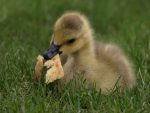Talk about nutrition, it is the need of every living thing, right? Nutrition is needed for balance supply in the body so that the body stays healthy and fit. With a healthy and fit body, anything we can do including daily activities.
The need for nutrition is not only needed by humans, animals that are in fact close to human life such as farm animals or that are consumed directly by humans also need nutrition. In addition to being safe when consumed, these nutrients also help the animals concerned to stay healthy and fit.
Regardless of how duck obtain their food, whether it be by scavenging, or consuming a complete ration, the food consumed must contain all the nutrients, in an available form, that are needed for maintenance, growth and reproduction. Not all ducks who search for food by scavenging will have more germs than duck fed. Cleanliness, feasibility, and nutrition in feed are the main things. It is not always the ration will guarantee the cleanliness and health of the ducks, and vice versa, not always the food on the streets has a negative impact on the ducks.
You certainly already know that duck can also diet, right? The diet in duck is where we control their food intake with the aim of maintaining duck weight and nutritional balance. The purpose of the duck diet is usually adjusted to the goals of the farmer. Of the many reasons, usually the duck diet aims to maintain their weight when the mating season arrive. Female duck that is too large usually produces bad eggs or even fails to produce. That’s why, the purpose of the duck diet is adjusted by farmers’ goals.
Back on the topic of nutrition what should be given to ducks during the diet process, below are the nutrients they need.
- Protein
In their wild life, ducks also consume some insects which are known for their high protein content. Small insects like crickets are their natural food. Many ducks eat mostly insects in spring and summer when insects are most plentiful and provide the best nutrition for growing ducklings. When the seasons change and insects aren’t as common, however, duck will switch their diet to more easily available foods. Considering that the duck you are maintaining may not be able to search for insect itself, you need to provide some insect as their diet menu. Another substitute for insect that you can also prepare such like snail, worms, and slug.
- Multivitamin
Duck also need a multivitamin intake during their diet. Vitamins such as Vitamin A, Vitamin D, Vitamin E, and Vitamin K are needed to balance the nutrition of duck during the diet. Their multivitamin needs can be obtained from leaves and fruits. All berries are enriched with the multivitamins they need. Although not a specialist type of fruit and vegetable eater, you can give them some vegetable and fruit foods as long as it’s needed.
- Water
As with the nutritional balance of duck, there will be no meaning if the food doesn’t contain water. Water is the crucial thing that every living thing need. Even though their food contains water, duck still need enough water. Although it is considered not to have high nutritional value, water has a very positive impact on diet. Water can dissolve food in the body so that it facilitates the digestive system. In a dietary pattern, smooth digestion is necessary. The more food waste is not removed from the body, the substances will add to the mass of the duck. Water will help facilitate their digestive system so that the process of filtering food substances can be done effectively.
- Mineral
In addition to the things needed above, during the duck diet also requires adequate mineral intake. This mineral can be obtained from salt. If you make your own food for your duck, adding a little salt will enrich their mineral needs. Ration or ready feed also usually contains minerals needed by duck.
Although as living creature ducks have a random way of eating where they eat a lot of things beyond their literal ducks (such as sand and gravel), in fact the balance of nutrient is an absolute thing. If your duck is in the process of diet, herding them for too long may damage the composition of the nutrients you have prepared before.
The duration of herding that is too long will make your duck easily hungry and eventually they try to look for food again outside their cage. Finding food outside the cage will make them eat something they shouldn’t eat. This doesn’t mean that as long as the duck diet has to be locked in a cage, you can feed them first before taking them out to herd.
In addition to paying attention to nutrition, the quantity of food that you give to your duck is something you should pay attention to. Because it would be very useless if the nutrients in the food had been arranged in such a way but were damaged by an improper quantity. Dietary goals in addition to controlling nutrition also control how much intake enters them.

